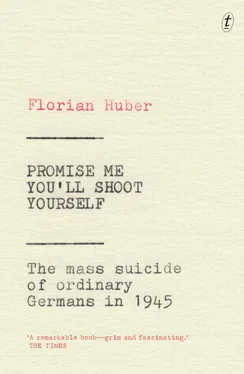All day long, soldiers came to the house in twos and threes, wanting schnapps and watches. They opened all the chests and trunks, and kept threatening to shoot—though one soldier sat down to play with the children. A Russian officer came into the vicarage living room and designated one of the villagers mayor by acclamation. When night came, the ‘Russian terror’ set in again as the soldiers went out with their torches in pursuit of women.
Then the grandmothers took a child each and the young mothers took their youngest from their prams, and they plunged out into the night, frightened and desperate, and drowned themselves in Farmer’s Pond. A young woman, a young girl and a little boy of five were pulled out alive. But fourteen unfortunate people died that night—eight drowned themselves and six put an end to their lives by hanging.
Maria Meinhof writes about the funeral service and the burials in two mass graves. She writes about other suicides in Ducherow and the surrounding region. In Anklam alone, there were three hundred. She describes the desperation of a Frau Schöttler, who waded into the village pond and called to the people on the banks: ‘Throw my children in after me.’
Losing and mourning loved ones was nothing new to Maria Meinhof; she had seen something of life. Yet even with her faith to shore her up, she could make no sense of what was happening. Her language is plain and sober; she never resorts to talk of divine providence or the mysterious ways in which God moves. In places, though, she goes no further than hints and roundabout descriptions; she keeps back a lot, because she has no comfort to offer her readers. ‘I could describe many, many more such sad fates,’ she said.
• • •
A particularly bizarre fate was suffered by the neighbouring parish of Alt Teterin, a tiny, remote speck on the map. The tanks of the 65th Soviet Army rolled down the main street early on the morning of 29 April, on their way to Demmin. Some families hid in the woods or in a ditch just outside the village; others stayed in their houses. That night, groups of soldiers went on the prowl, raping women and rounding up men. They took the men to the neighbouring village of Stretense.
As the people of Alt Teterin waited, tense and frightened, they heard a strange, menacing noise coming from the direction of Stretense—a hideous, nerve-shattering drone, like nothing they had ever heard before. It was to become the soundtrack to the horrors of that night; in the minds of some, the grinding, pounding sound became linked to the propaganda they had heard about the Soviet steamroller. Among the women, the rumour soon spread that the Red Army soldiers in Stretense had started up a ‘hell machine’—a gigantic mincer, like a huge motorised human press, which they were feeding with the men they’d rounded up and led away.
Now Alt Teterin, too, was hit by a wave of suicides. The first to take their lives were three housefuls of women who had been raped. Then an elderly man went from house to house, collecting women and children; soon neighbours and relatives joined him and went with him from door to door. Scared and distraught, people made for the woods or the drainage ditch outside the village. Mothers drowned their children and hanged themselves in trees. The elderly man hanged himself last of all. By the end, thirty-two people had died in the tiny village of Alt Teterin. Urgency, contagion, fear. Demmin was everywhere.
Nowhere in the western territories of the German Reich was mass suicide as rife as in East and West Prussia, Silesia, Pomerania, Mecklenburg, Brandenburg or Berlin. Fear of the Red Army was so firmly rooted in people’s minds that the Soviets’ approach often triggered deadly panic. As Soviet troops marched into the towns and villages of the east, the rumours and propaganda were transformed again and again into dire reality. Women in particular saw no other way out than to kill themselves, and often their children too. There was a general feeling of desperation.
But this feeling wasn’t limited to the east. In western Germany, too, many people no longer saw a future for themselves. All over the country, people felt frightened and helpless as they found themselves confronted with imminent defeat and the collapse of the social order. They sensed guilt closing in on them and feared that revenge and retribution were inevitable.
• • •
Herr Reidel from Rüsselsheim, in the Rhine-Main region, was a good-looking and imposing young man. He had left Rüsselsheim—a city important to the German arms industry because of its automobile factories—after the 1944 air raids and moved with his family to Siefersheim, fifty kilometres away. In this tight-knit village, Reidel was surrounded by an aura of rumour and secrecy. He and his family—his strikingly dressed wife and smart little girls—held a strange fascination for the local children. They presented an idyllic family picture such as most people in Germany hadn’t seen since before the war. Johann Radein, who was just a boy at the time, devotes an entire chapter of his childhood memoirs to the Reidel family, who intrigued him. ‘Aged twelve, I always wonder why Herr Reidel isn’t a soldier at the front. I get no answer from the grown-ups.’
But Johann felt drawn to Herr Reidel. The boy often found him outside the Reidels’ house, staring up at the sky through his binoculars, on the lookout for enemy aircraft. Herr Reidel would explain to Johann in expert detail all about the different kinds of planes circling overhead and occasionally looping down, trailing a wisp of smoke. At other times, Johann found him in his garden, sowing or weeding; he sometimes invited Johann to help him pick cherries. But Johann never solved the mystery of Herr Reidel—never worked out who or what he was, or how he’d managed to escape active service.
I don’t dare ask him any questions, this fair, good-looking man with his flashing eyes, lively manner and brisk gestures. But when his charmingly dressed, curly blond daughter comes hand-in-hand with her friends to visit her father, the happy man devotes himself so intently and lovingly to them that he forgets I’m there, and I slip away from the intimate scene.
The village of Siefersheim made it through to the end of the war without bloody battles or losses, and in March 1945 it was occupied by US soldiers. The villagers took down their pictures of the Führer, burnt their brown shirts and tried to look ahead. But Siefersheim was not to escape altogether, and the horrors of defeat were finally visited on the village one day in June, when Herr Reidel, friendly neighbour and loving father, dispatched his entire family. Six-year-old Sigrid, baby Else, his wife and himself—he shot them all with his pistol. Johann Radein heard the news at the house of a friend, the son of the village mayor, who immediately rushed to Reidel’s house:
My friend and I follow. At the scene of the crime, we wait at the gate with two grown-ups. When Mayor Espenschied re-emerges from the Reidel family’s house, he looks very pale and sounds agitated as he says: ‘I told them so.’
The mayor had known that Reidel had two pistols in his possession, and had urged him to get rid of them or hand them in. Since the war had ended, he’d often tried to talk him out of his Nazi beliefs and suicidal plans, too. ‘It’s over. You have to resign yourself to that.’ But Reidel didn’t want to resign himself to the loss of his world and a life among enemies. In the note addressed to the parish of Siefersheim found in his house, he said he had chosen to commit suicide with his family so as not to burden anyone.
Now the rumours about Reidel ran riot. The villagers, seeking to explain the inexplicable, searched for motives in his past. One man suspected that he’d been involved in the Rüsselsheim massacre. In August 1944, after an air raid on Reidel’s hometown, American airmen from a plane shot down by the Luftwaffe had been marched through the town, and members of the public had pelted them with stones and roof tiles, and hit them with hammers and spades. Six of the airmen died, and it was rumoured that Reidel was on the US military’s wanted list. But the rumours were never confirmed. Even in later years, Johann Radein was unable to solve the mystery of Herr Reidel’s guilt and desperation. ‘I’ll never forget the sight of those two horse-drawn carts carrying the children and their parents round the edge of the village to the cemetery,’ he wrote.
Читать дальше












